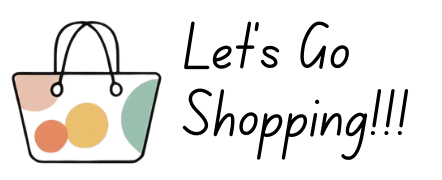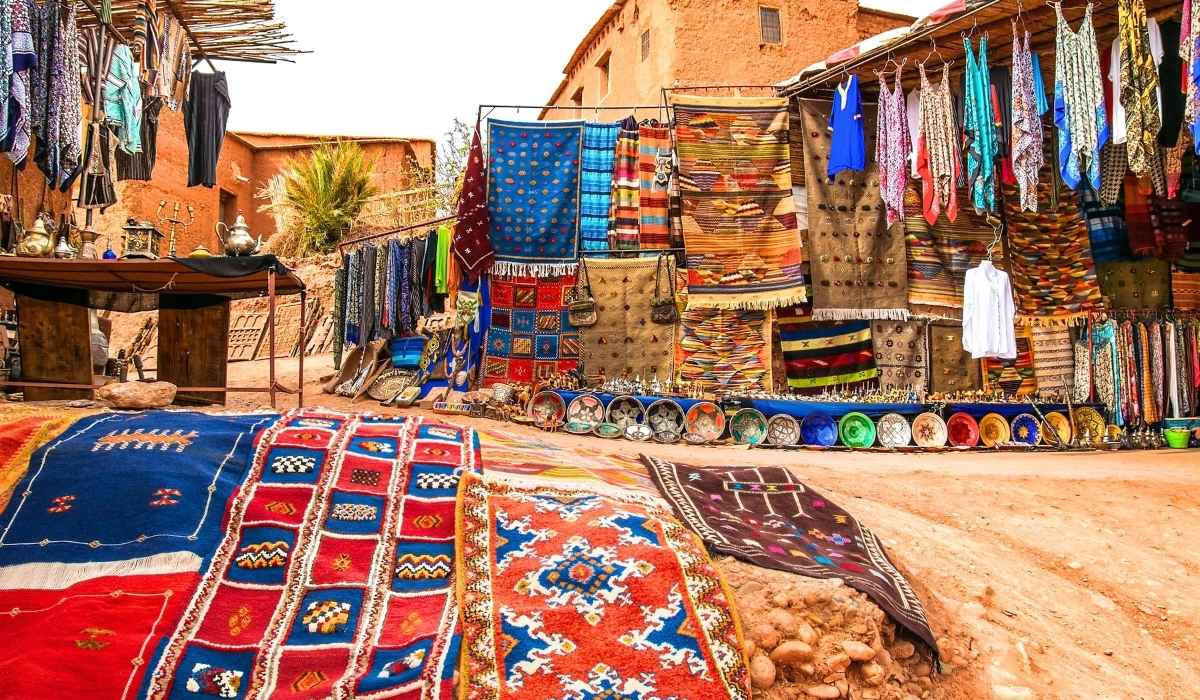Morocco! The North African country is not just famous for its camel rides and exquisite cuisine but also for its Atlas trekking and ski resorts. As travel advisors and leads, we can assure you visiting Morocco is a dream come true, only more vibrant and colorful. And there is so much more to Morocco other than its captivating rich history, world-class architecture, magnificent monuments and mountain scenery – it’s a dreamland for shoppers! From the buzzing souks of Marrakech to the artisan quarters of Fes and the relaxed coastal vibes of Essaouira, Morocco offers an array of authentic, handmade souvenirs worth taking home.
Confused on what to shop as souvenirs from Morocco with so many tempting items catching your fancy? Don’t worry, we’ve got you covered with a curated list of what to buy in Morocco and how much to pay for each. Let’s take off!
What To Buy In Morocco- A Complete Shopping Guide For Tourists
Products from Morocco are more than just souvenirs; they’re pieces of a living culture. Given the deep history and the influence of many civilizations on the country, each item carries the imprint of Morocco’s diverse heritage (Arab, Berber, African, and French cultural influences all wrapped into one). Shopping here is not just about collecting local products; it’s about connecting with artisans and experiencing the country’s artistic soul. This shopping guide highlights what kinds of souvenirs to buy in Morocco, ensuring you bring back not just items but memories that will stay with you (and your loved ones) long after your trip ends.
1. Moroccan Leather Bags And Other Goods
Moroccan leather is world-famous for its smooth and supple quality— a reputation that rivals high-end brands like Louis Vuitton, but at a fraction of the price. In fact, high-quality leather goods are significantly cheaper in Morocco, making it a paradise for leather lovers. You can get a wide variety of belts, wallets and even leather slippers that will be a delight for anyone to receive as gift and even for self-use.
LTST TIP: Don’t forget to look for even, tight stitches when buying leather bags in Morocco.
If the leather is genuine, you will be able to recognize it by its distinct scent. The best part is that you can shop from a wide variety, ranging from camel and cow leather to sheep and goat leather.
Where to buy: You can go to Marrakech, Rissani or Fez. You can also tell them to customize your products, like leather jackets.
Price range: Expect to pay around 300-800 MAD for a gym bag made of leather. Don’t forget to bargain!
2. Moroccan Rugs
To all our travel partners who have visited Morocco, we have given them only one piece of advice and that is to bargain hard! There is no shortcut to it. When it comes to the traditional rugs, they are much cheaper in Morocco but it all comes down to your bargaining skills. Don’t forget to check how old the rug is, how big it is and what purpose are you buying it for.
Morocco has a nomadic heritage and the handwoven Berber carpets are a true reflection of that culture, their craftsmanship and textures. Each piece is a symbol of the cultural influences of the country, weaving a story of the tribesmen. So, a rug’s patterns and colors reflect so much, from the weaver’s tribe to his personal experiences. They make for excellent souvenirs, but can also be heavy to carry and expensive.
Price range: Small rugs: 300–600 MAD; Larger pieces: 1,000–5,000 MAD
Where to buy: Souk Semmarine, Marrakech, Cooperatives in Taznakht or Ourika Valley Taznakht are filled with carpet workshops. You can also check out Fez.
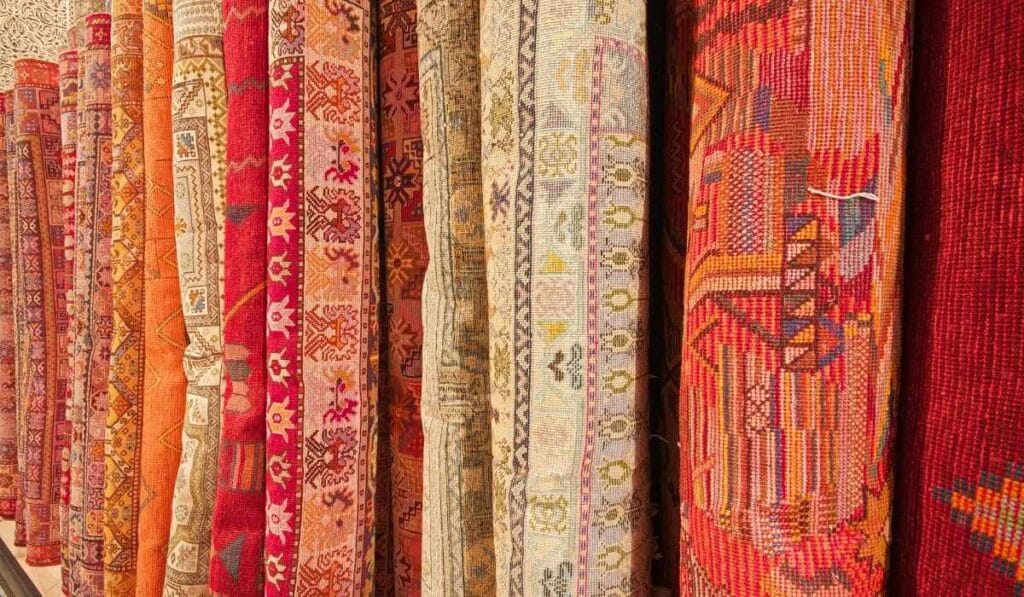
3. Argan oil
Extracted from roasted seeds, Argan oil is hands-down the best souvenir to buy in Morocco. You can either go for the ‘cosmetic’ or ‘culinary’ argan basis your need or the need of your folks back home. Highly acclaimed for its health and cosmetic benefits alike, you will get it cheaper here than the rest of the world because it is produced in-house and is tax-free here.
LTST TIP: If it’s thick, golden-yellow in color and has a nutty smell, it’s true argan.
So, what are you waiting for? It’s time to stock up shampoos and lotions, with argan infused in them!
Where to buy: Go to locations like Women’s Cooperatives in Essaouira, Herbalist shops (herboristeries) in Marrakech, Agadir and smaller villages for better prices and genuine product.
Price range: For 100mL of cosmetic argan oil, you should expect to pay at least 50–75 MAD, with high-quality options reaching up to 150 MAD. Culinary argan oil tends to be a bit more expensive, typically ranging from 100 to 300 MAD for the same quantity.
4. Spices From The “The Place Of Sunset”
On my personal travel to this sensory country, I came back with so many spices and mixes that we had to buy another suitcase to carry them all back home! My mother loves to load her food with spices, be it cumin, white pepper, cinnamon or paprika. And since Morocco is famous for its spices, it was a heavenly experience for her! She has not stopped rambling about how they grind fresh spices over there. So, if you’re a chef who loves to garnish their dishes with saffron, cumin, ras al and turmeric, choosing a Morocco spice mix gift pack is the right fit for you.
Where to buy: The best places to buy authentic and fresh spices are Rahba Kedima (Spice Square) and Souk El Attarine in Marrakech. For saffron, Tailounie is the most recommended place.
Price range: (These are averages and based on 100 grams). Saffron (1 gram) 50-70 MAD. Ras al hanout: 30 MAD. Cumin, paprika, turmeric: 20 MAD. Pepper, ginger, cinnamon: 15 MAD. Dry mint: 10 MAD.
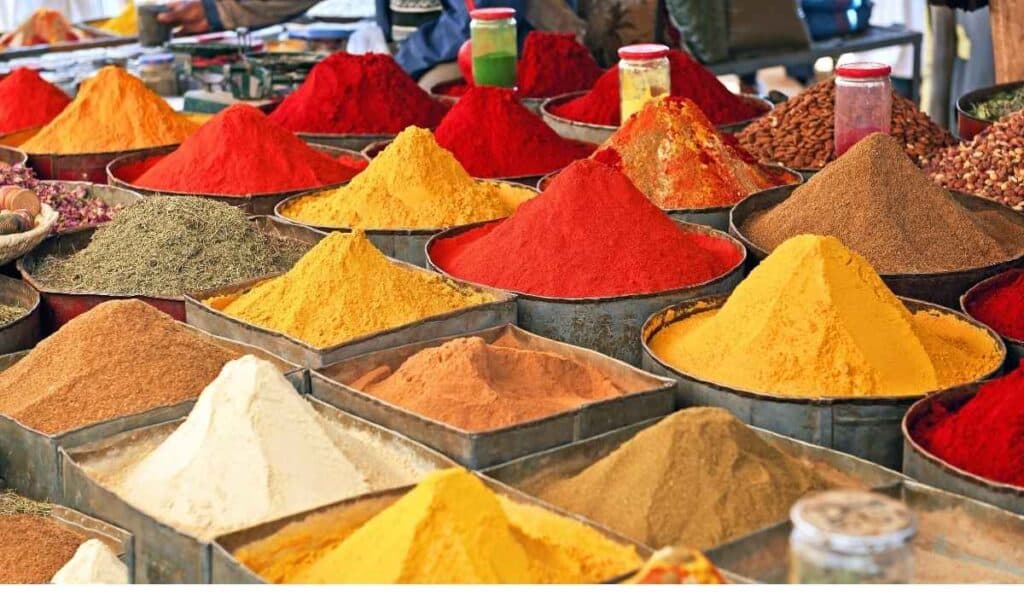
5. Lamps And Lanterns
A warm Moroccan gift to give your room the romantic vibes you need, would be a lamp or a lantern. If you want an affordable option, go for a lighter weight lantern, which is made of aluminum. Intricately pierced metal lanterns cast magical shadows and bring Moroccan ambiance into your living space, and also make for a great souvenir for your people back home.
Yes, it will take up some space in your luggage but will also add the exotic touch and elegance to your room when you go back home.
Where to buy: Souk Haddadine, Place des Ferblantiers, Marrakech and Fes Medina Craft Shops are great options to shop for some wonderful, mosaic colored lamps and lanterns you’d absolutely adore.
Price range: The lightweight lamps typically range from 100 MAD to 500 MAD, depending on their size and the level of craftsmanship. For the heavier metal lamps, prices generally begin at around 300 MAD for smaller designs and can go up to 1,000–2,000 MAD for larger, intricately made pieces.
6. Ceramics From Morocco – Excellent Souvenirs
Hand-painted in vivid colors and intricate geometric designs, these make up for the most thoughtful gifts from Morocco, especially for your parents and elderly family member. Each piece tells a story through its artistry, from bowls and cups to plates and tagines. From Fes blue pottery to colorful glazed bowls and tajines, Moroccan ceramics are both functional and decorative.
- Where to buy: Fez (for traditional blue and white designs), Safi (a major ceramics hub), and Tamegroute (for distinctive green pottery).
- Price range: Small bowls and cups: 30–100 MAD; Larger platters or tagines: 200–800 MAD depending on size and detail.
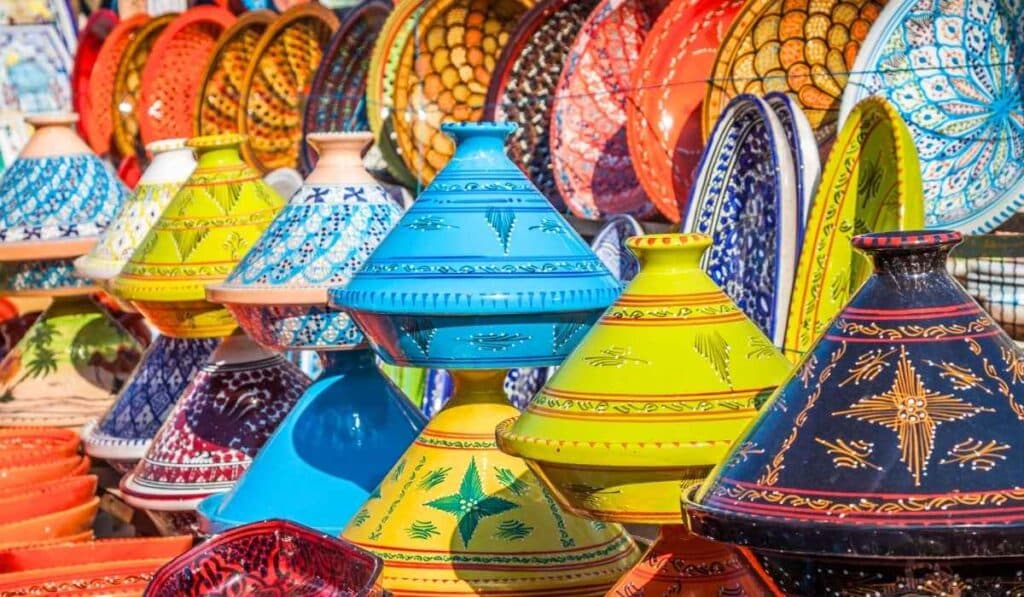
7. Wooden Boxes With Carvings (Thuya Wood)
Whether it’s storing jewelry or your nostalgic childhood memories, these boxes are not just meant to keep things intact but also add aesthetic to your room. When looking for things to buy from Morocco, you can’t skip these because they are beautifully carved by skilled woodworkers. Thuya wood, native to Morocco, is highly aromatic and polished to a glossy finish. The geometric designs and the lustrous finishes will leave you mesmerized!
Where to buy: You can find them in souks (traditional markets) in cities like Fes, Essaouira Wood Workshops, Artisan Stalls in Azrou and Marrakech.
Price range: Small boxes: 50–150 MAD; Larger items or intricate work: 300–1,000 MAD.
8. Traditional Clothing Items (Kaftans & Djellabas)
Still wondering what to buy in Morocco? Well, you can’t skip clothes shopping in Morocco, especially if ‘Boho’ is your cool go-to style! Shop for kaftans and djellabas, known for their flowing silhouettes, vibrant colors, and exquisite embroidery. Kaftans, often detailed with beadwork, make elegant evening wear, while hooded djellabas offer everyday comfort for both men and women.
You can complement your outfit with turbans and headscarves. Crafted from soft fabrics and adorned in bold patterns, these versatile pieces are a great reflection of Morocco’s heritage.
Where to buy: The best places are the souks (markets) in cities like Marrakech and Fez.
Price range: Kaftans: 500–1,500 MAD; Djellabas: 150–300 MAD; Turbans & headscarves: 30–100 MAD.
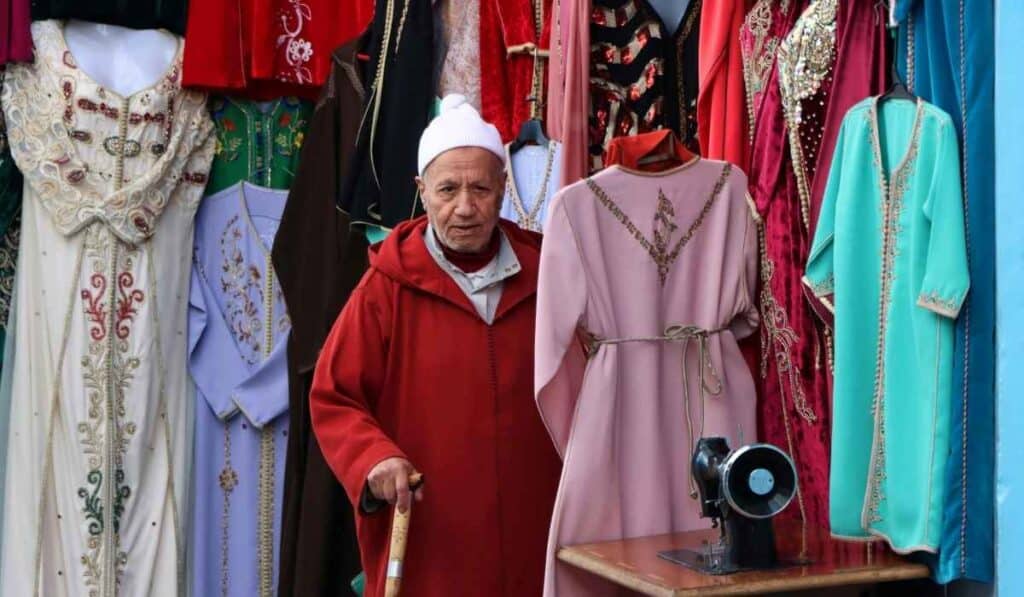
9. Handwoven Baskets & Straw Bags
If you want to bring back something for your mother, what could be a better local product than a woven basket? Made from natural materials like straw and palm leaves, they ooze warmth. Perfect for beach days or market runs, these stylish and eco-friendly items are lightweight and easy to carry home over a flight.
So yes, if you are in Morocco, it is time to bring a hint of Moroccan flair to your home!
Where to buy: Look for authentic, handcrafted baskets in rural towns such as Chefchaouen and Asilah, where local artisans preserve time-honored weaving techniques.
Price range: Woven baskets in Morocco typically range from 100 MAD for smaller ones to around 200 MAD for larger ones.
10. Henna Products And Natural Beauty Products
The Henna plant thrives in desert climates and can be most found in the Zagora region in Southern Morocco. Be it weddings or pregnancies, applying henna is an important social ritual there. Did you know that the bride sometimes writes her groom’s name discreetly in her hand design? Also, only married women can get henna on their feet.
Moroccans believe that henna brings good luck and protection from the evil eye. They also believe that the darker stain on your hand signifies your partner loves you a lot. If not for hand, you can also buy Moroccan henna to color your hair. You’ll also find kohl eyeliner, black soap, and rosewater true to their originality from Morocco.
Where to buy: Local beauty shops or herb markets (like Souk El Kebir).
Price range: Henna cones: 10–20 MAD each; Powdered henna (100g): 30–50 MAD.
11. Sweets From Morocco
If you have a sweet tooth, Moroccan pastries are a must-buy. Made with ingredients like honey, dates and almonds, these traditional treats will just melt in your mouth! Their nutty/rich texture and their beautiful packaging make them the perfect souvenir for your family and friends. Popular options include chebakia (sesame and honey spirals), ghriba (almond or coconut cookies), and briouat (almond-filled pastries).
Where to buy: You can find them in patisseries in cities like Casablanca, Marrakech and Rabat.
Price range: Starts at 50 MAD (for pre-packed boxes) and premium assortments can go up to 150-300 MAD.
12. Babouche Slippers
If you want to add a bohemian flair to your outfits, go for a pair of babouche slippers. They are not just comfy; they are also very stylish. Perfect for lounging at home, some are open-back while some are closed. So, it’s high time you add a touch of suede to your outfit, with bright colors and intricate embroidery.
Where to buy: Go to souks in Marrakech, Tiznit and Fez.
Price range: Depending on the quality and design, the prices vary from 80-250 MAD.
13. Zellige Tiles & Mosaics
Zellige tiles and Mosaics can make a stunning addition to your home decor. They are not just hand-cut but also very intricate. Each piece is an epitome of geometric artistry. They are generally used to decorate Moroccan floors and fountains. These traditional tiles showcase intricate geometric patterns and can be used for coasters, tabletops, or wall décor. You can get small coasters, Mosaic wall pieces, and custom table-tops are affordable prices making them a great choice
Where to buy: Check out tile workshops in Fez and Meknes and craft stalls in Marrakech
Price range: The individual tiles cost around 30–70 MAD. The price range of sets or framed designs is 200–600 MAD.
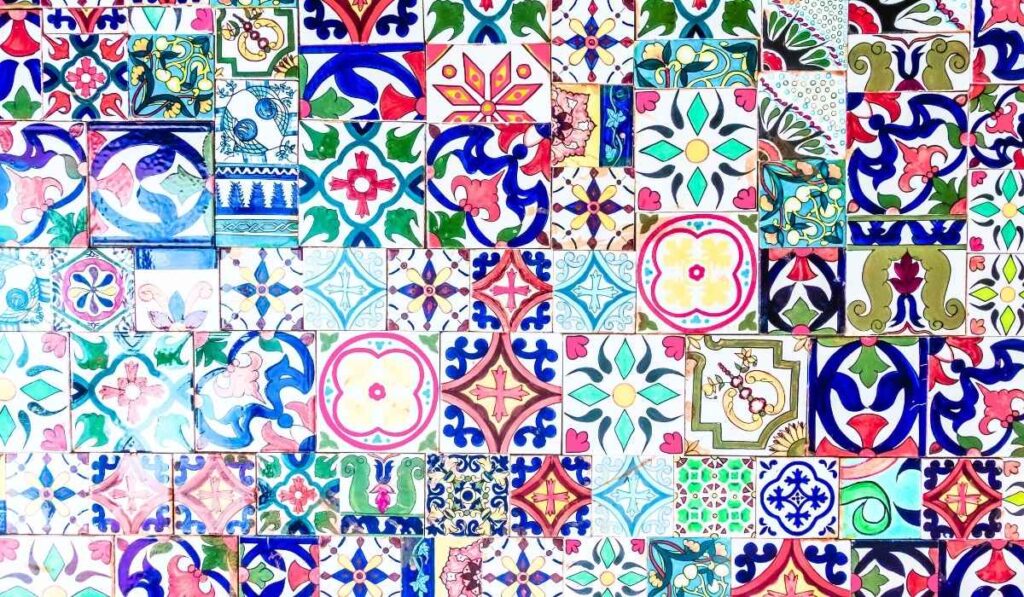
14. Jewelry & Berber Jewelry
When I went to Morocco, I stacked up a lot of silver and bronze jewelry for not just my family, and my friends. Each piece is handcrafted by skilled artisans, often using techniques that have remained unchanged for centuries. Worn for beauty, protection, and social status, these intricate designs are infused with meaning. Handmade filigree, engraving, repoussé (metal embossing), and inlays of coral, amber, and enamel make each one of these a statement piece, cherished for years and years. Some of the pieces you’d love are:
- Fibula (brooch for your hair)
- Khalkhal (silver anklet bracelet)
- Khamsa (design of ‘upside-down hand’ to ward off evil)
- Tuareg jewelry – minimalist, engraved silver often set with ebony or stones
Where to buy: I was scammed once with fake silver in Marrakech, so be careful. I would suggest you to go to Essaouira, which is a town famous for its silver. Tiznit is also known as the silver capital of Morocco, this southern town is famed for its high-quality Berber silver workshops.
Price range: You might have to pay at least 500 MAD for a great piece, but it varies with design and style.
LTST Tip: Real silver feels heavy and often has slight imperfections due to handmade nature.
15. Moroccan Musical Instruments
If you’re musically inclined — or just want something exotic and meaningful for your display shelf — Morocco offers a rich selection of traditional instruments. Particularly in Essaouira, the spiritual home of Gnawa music, these instruments are more than just souvenirs; they’re part of a living soundscape deeply rooted in African, Arab, and Berber heritage.
Gnawa music has a truly unique sound, characterized by hypnotic chanting, rhythmic drumming, and instruments like the gimbri (a three-stringed lute), bendir (a frame drum), and qraqeb (metal castanets). Even if you don’t want to carry home a full-sized instrument, picking up a recording of live Gnawa music or attending a local concert is highly recommended — it’s an unforgettable experience, especially at night in Essaouira.
For those who do want to bring an instrument home, you can choose between more Arabic styles like the oud (similar to a guitar) or indigenous ones like the rabab and krakeb.
Where to buy: Music shops and artisan stalls in Marrakech, Essaouira, and Taroudant.
Price range: Small percussion instruments start at 100 MAD; string instruments can go up to 800–1,500 MAD.
16. Moroccan Tea Sets
If you or someone you know is a tea lover, then an exquisite Moroccan Tea set will make a perfect gift from Morocco. Typically made from steel or silver, beautiful patterns and often intricately engraved, beautiful silver and brass tea sets are a way to take Morocco with you to your home. When accompanied by engraved trays and colorful glasses, they make a treat for eyes and set the table for beautiful conversations and lovely tea . Buying a Moroccan tea set is a way to bring this cultural ritual into your own home.
Where to buy: Marrakech Medina – especially in the souks near Rahba Kedima and Place des Ferblantiers offer lovely hand painted and engraved tea-sets collections. Casablanca & Rabat, Fes, Chefchaouen & Essaouira are also great places to shop for Moroccan Tea sets and glasses.
Price range: You can get a decent gifting option under 400 MAD, and you can buy yourself some great tea-sets in the range of 1000 MAD and upward, depending upon the design and whether you go for the complete sets.
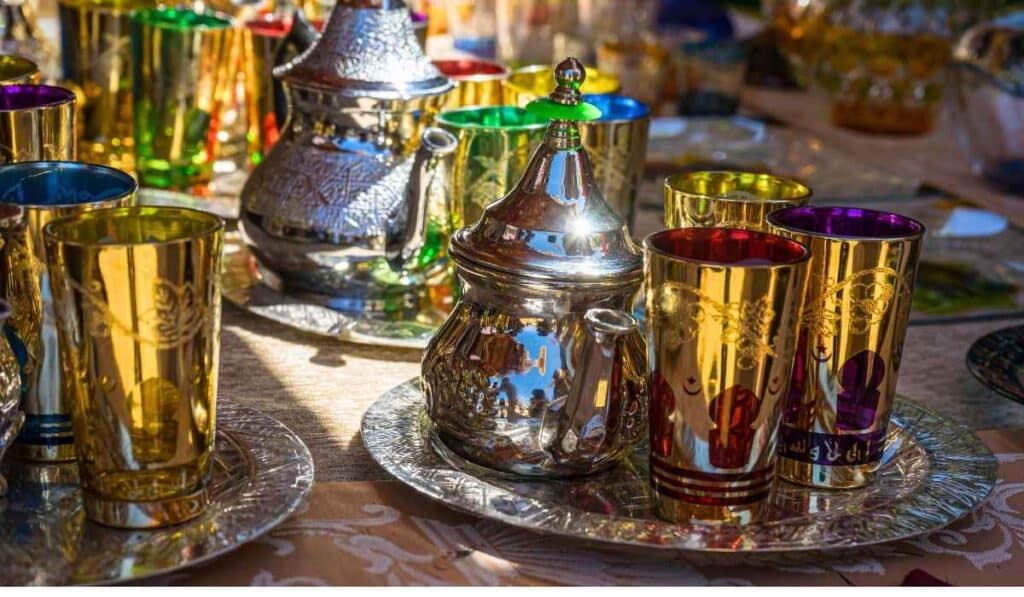
Final Tips for Souvenir Shopping in Morocco
- Bargain, but with a smile: Haggling is part of the culture. Be polite, patient, and walk away if needed.
- Cash is king: Many shops don’t accept cards, especially in smaller towns.
- Check customs rules: Some items like ivory or antique artifacts may be restricted in your home country.
- Support local cooperatives: They often provide fair wages to artisans, especially women.
Finally, Morocco isn’t just a destination — it’s an experience that lingers in your senses and soul. From sipping mint tea in a bustling medina to admiring the craftsmanship in the souks, shopping here becomes part of the journey. If you’ve been wondering what to buy in Morocco, the answer lies in its vibrant markets filled with culture, color, and character.
Whether you’re after a functional piece like a woven basket or a symbolic one like henna, each souvenir carries a story of Morocco. These treasures aren’t just things — they’re conversations, memories, and a celebration of Morocco’s rich artistic spirit. Every rug has a history, every lantern a flicker of tradition, and every jar of spice a taste of the land. Shopping here is not just about finding the best deal, but about connecting with the people who make these crafts come to life.
So, bring an extra bag, sharpen your bargaining skills, and dive into the magical world of Moroccan markets. Trust me, your suitcase — and your heart — will be full on the way back home.
